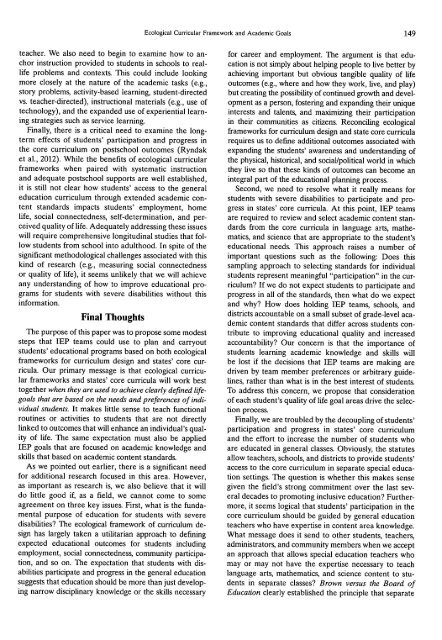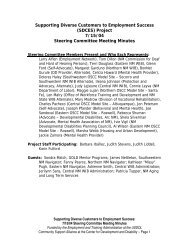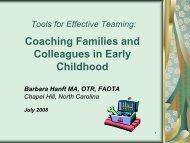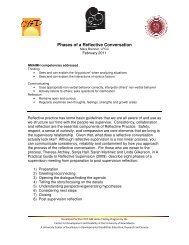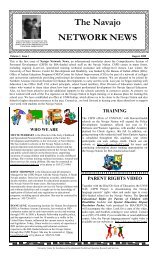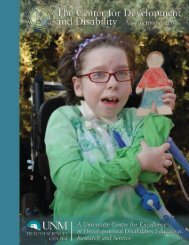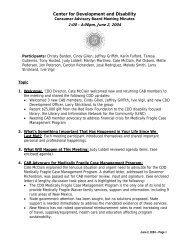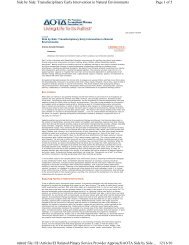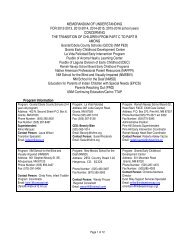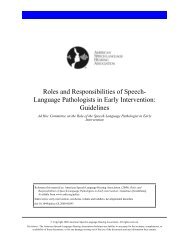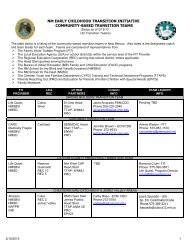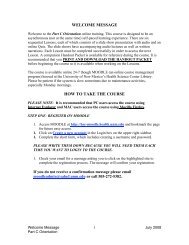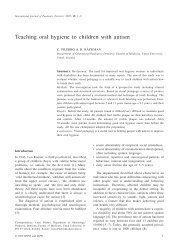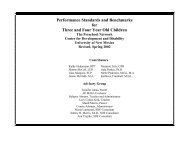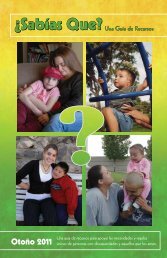Reconciling an Ecological Curricular Framwork Focusing on Quality ...
Reconciling an Ecological Curricular Framwork Focusing on Quality ...
Reconciling an Ecological Curricular Framwork Focusing on Quality ...
Create successful ePaper yourself
Turn your PDF publications into a flip-book with our unique Google optimized e-Paper software.
teacher. We also need to begin to examine bow to <str<strong>on</strong>g>an</str<strong>on</strong>g>cbor<br />
instructi<strong>on</strong> provided to students in schools to reallife<br />
problems <str<strong>on</strong>g>an</str<strong>on</strong>g>d c<strong>on</strong>texts. This could include looking<br />
more closely at the nature of the academic tasks (e.g.,<br />
story problems, activity-based learning, student-directed<br />
vs. teacber-directed), instrucfi<strong>on</strong>al materials (e.g., use of<br />
technology), <str<strong>on</strong>g>an</str<strong>on</strong>g>d tbe exp<str<strong>on</strong>g>an</str<strong>on</strong>g>ded use of experienfial learning<br />
strategies sucb as service learning.<br />
Finally, there is a critical need to examine tbe l<strong>on</strong>gterm<br />
effects of students' participati<strong>on</strong> <str<strong>on</strong>g>an</str<strong>on</strong>g>d progress in<br />
tbe core curriculum <strong>on</strong> postscbool outcomes (Ryndak<br />
et al., 2012). While tbe benefits of ecological curricular<br />
frameworks when paired with systematic instructi<strong>on</strong><br />
<str<strong>on</strong>g>an</str<strong>on</strong>g>d adequate postschool supports are well established,<br />
it is still not clear bow students' access to tbe general<br />
educati<strong>on</strong> curriculum through extended academic c<strong>on</strong>tent<br />
st<str<strong>on</strong>g>an</str<strong>on</strong>g>dards impacts students' employment, bome<br />
life, social c<strong>on</strong>nectedness, self-determinati<strong>on</strong>, <str<strong>on</strong>g>an</str<strong>on</strong>g>d perceived<br />
quality of hfe. Adequately addressing tbese issues<br />
will require comprebensive l<strong>on</strong>gitudinal studies that follow<br />
students from school into adulthood. In spite of the<br />
signific<str<strong>on</strong>g>an</str<strong>on</strong>g>t methodological challenges associated with tbis<br />
kind of research (e.g., measuring social cotmectedness<br />
or quality of life), it seems unlikely that we will achieve<br />
<str<strong>on</strong>g>an</str<strong>on</strong>g>y underst<str<strong>on</strong>g>an</str<strong>on</strong>g>ding of bow to improve educafi<strong>on</strong>al programs<br />
for students with severe disabilities without tbis<br />
informati<strong>on</strong>.<br />
Final Thoughts<br />
Tbe purpose of tbis paper was to propose some modest<br />
steps tbat IEP teams could use to pl<str<strong>on</strong>g>an</str<strong>on</strong>g> <str<strong>on</strong>g>an</str<strong>on</strong>g>d carryout<br />
students' educati<strong>on</strong>al programs based <strong>on</strong> botb ecological<br />
frameworks for curriculum design <str<strong>on</strong>g>an</str<strong>on</strong>g>d states' core curricula.<br />
Otir primary message is that ecological curricular<br />
frameworks <str<strong>on</strong>g>an</str<strong>on</strong>g>d states' core curricula will work best<br />
together when they are used to achieve clearly defined lifegoals<br />
that are based <strong>on</strong> the needs <str<strong>on</strong>g>an</str<strong>on</strong>g>d preferences of individual<br />
students. It makes little sense to teach funcfi<strong>on</strong>al<br />
routines or activifies to students that are not directly<br />
linked to outcomes that will enh<str<strong>on</strong>g>an</str<strong>on</strong>g>ce <str<strong>on</strong>g>an</str<strong>on</strong>g> individual's quality<br />
of life. The same expectati<strong>on</strong> must also be applied<br />
IEP goals that are focused <strong>on</strong> academic knowledge <str<strong>on</strong>g>an</str<strong>on</strong>g>d<br />
skills tbat based <strong>on</strong> academic c<strong>on</strong>tent st<str<strong>on</strong>g>an</str<strong>on</strong>g>dards.<br />
As we pointed out earlier, tbere is a signific<str<strong>on</strong>g>an</str<strong>on</strong>g>t need<br />
for additi<strong>on</strong>al research focused in this area. However,<br />
as import<str<strong>on</strong>g>an</str<strong>on</strong>g>t as research is, we also believe tbat it will<br />
do httle good if, as a field, we c<str<strong>on</strong>g>an</str<strong>on</strong>g>not come to some<br />
agreement <strong>on</strong> three key issues. First, what is the fundamental<br />
purpose of educati<strong>on</strong> for students with severe<br />
disabilities? Tbe ecological framework of curriculum design<br />
bas largely taken a utilitari<str<strong>on</strong>g>an</str<strong>on</strong>g> approacb to defining<br />
expected educafi<strong>on</strong>al outcomes for students including<br />
employment, social c<strong>on</strong>nectedness, community participafi<strong>on</strong>,<br />
<str<strong>on</strong>g>an</str<strong>on</strong>g>d so <strong>on</strong>. The expectati<strong>on</strong> that students with disabilities<br />
parficipate <str<strong>on</strong>g>an</str<strong>on</strong>g>d progress in tbe general educad<strong>on</strong><br />
suggests that educad<strong>on</strong> should be more th<str<strong>on</strong>g>an</str<strong>on</strong>g> just developing<br />
narrow disciplinary knowledge or tbe skills necessary<br />
<str<strong>on</strong>g>Ecological</str<strong>on</strong>g> <str<strong>on</strong>g>Curricular</str<strong>on</strong>g> Framework <str<strong>on</strong>g>an</str<strong>on</strong>g>d Academic Goals 149<br />
for career <str<strong>on</strong>g>an</str<strong>on</strong>g>d employment. The argument is that educad<strong>on</strong><br />
is not simply about helping people to live better by<br />
achieving import<str<strong>on</strong>g>an</str<strong>on</strong>g>t but obvious t<str<strong>on</strong>g>an</str<strong>on</strong>g>gible quality of life<br />
outcomes (e.g., where <str<strong>on</strong>g>an</str<strong>on</strong>g>d how they work. Uve, <str<strong>on</strong>g>an</str<strong>on</strong>g>d play)<br />
but creating tbe possibility of c<strong>on</strong>tinued growtb <str<strong>on</strong>g>an</str<strong>on</strong>g>d development<br />
as a pers<strong>on</strong>, fostering <str<strong>on</strong>g>an</str<strong>on</strong>g>d exp<str<strong>on</strong>g>an</str<strong>on</strong>g>ding their tinique<br />
interests <str<strong>on</strong>g>an</str<strong>on</strong>g>d talents, <str<strong>on</strong>g>an</str<strong>on</strong>g>d maximizing their pardcipad<strong>on</strong><br />
in their commtinides as citizens. <str<strong>on</strong>g>Rec<strong>on</strong>ciling</str<strong>on</strong>g> ecological<br />
frameworks for curriculum design <str<strong>on</strong>g>an</str<strong>on</strong>g>d state core curricula<br />
requires us to define addid<strong>on</strong>al outcomes associated witb<br />
exp<str<strong>on</strong>g>an</str<strong>on</strong>g>ding tbe students' awareness <str<strong>on</strong>g>an</str<strong>on</strong>g>d underst<str<strong>on</strong>g>an</str<strong>on</strong>g>ding of<br />
tbe pbysical, bistorical, <str<strong>on</strong>g>an</str<strong>on</strong>g>d social/polidcal world in wbicb<br />
tbey Uve so tbat tbese kinds of outcomes c<str<strong>on</strong>g>an</str<strong>on</strong>g> become <str<strong>on</strong>g>an</str<strong>on</strong>g><br />
integral part of tbe educad<strong>on</strong>al pl<str<strong>on</strong>g>an</str<strong>on</strong>g>ning process.<br />
Sec<strong>on</strong>d, we need to resolve wbat it really me<str<strong>on</strong>g>an</str<strong>on</strong>g>s for<br />
students witb severe disabihdes to pardcipate <str<strong>on</strong>g>an</str<strong>on</strong>g>d progress<br />
in states' core curricula. At tbis point, IEP teams<br />
are required to review <str<strong>on</strong>g>an</str<strong>on</strong>g>d select academic c<strong>on</strong>tent st<str<strong>on</strong>g>an</str<strong>on</strong>g>dards<br />
from the core curricula in l<str<strong>on</strong>g>an</str<strong>on</strong>g>guage arts, mathematics,<br />
<str<strong>on</strong>g>an</str<strong>on</strong>g>d science that are appropriate to the student's<br />
educati<strong>on</strong>al needs. This approach raises a number of<br />
import<str<strong>on</strong>g>an</str<strong>on</strong>g>t questi<strong>on</strong>s sucb as tbe following: Does tbis<br />
sampling approach to selecdng st<str<strong>on</strong>g>an</str<strong>on</strong>g>dards for individual<br />
students represent me<str<strong>on</strong>g>an</str<strong>on</strong>g>ingful "participati<strong>on</strong>" in tbe curriculum?<br />
If we do not expect students to pardcipate <str<strong>on</strong>g>an</str<strong>on</strong>g>d<br />
progress in all of tbe st<str<strong>on</strong>g>an</str<strong>on</strong>g>dards, then what do we expect<br />
<str<strong>on</strong>g>an</str<strong>on</strong>g>d why? How does holding IEP teams, schools, <str<strong>on</strong>g>an</str<strong>on</strong>g>d<br />
districts accountable <strong>on</strong> a small subset of grade-level academic<br />
c<strong>on</strong>tent st<str<strong>on</strong>g>an</str<strong>on</strong>g>dards that differ across students c<strong>on</strong>tribute<br />
to improving educad<strong>on</strong>al quality <str<strong>on</strong>g>an</str<strong>on</strong>g>d increased<br />
accountability? Our c<strong>on</strong>cem is that the import<str<strong>on</strong>g>an</str<strong>on</strong>g>ce of<br />
students leaming academic knowledge <str<strong>on</strong>g>an</str<strong>on</strong>g>d skills will<br />
be lost if tbe decisi<strong>on</strong>s that IEP teams are making are<br />
driven by team member preferences or arbitrary gtiidelines,<br />
ratber tb<str<strong>on</strong>g>an</str<strong>on</strong>g> what is in the best interest of students.<br />
To address this c<strong>on</strong>cem, we propose tbat c<strong>on</strong>siderati<strong>on</strong><br />
of eacb student's quahty of life goal areas drive tbe selecd<strong>on</strong><br />
process.<br />
Finally, we are troubled by tbe decoupling of students'<br />
participati<strong>on</strong> <str<strong>on</strong>g>an</str<strong>on</strong>g>d progress in states' core curriculum<br />
<str<strong>on</strong>g>an</str<strong>on</strong>g>d the effort to increase the number of students who<br />
are educated in general classes. Obviously, the statutes<br />
allow teachers, schools, <str<strong>on</strong>g>an</str<strong>on</strong>g>d districts to provide students'<br />
access to the core curriculum in separate special educati<strong>on</strong><br />
settings. The quesd<strong>on</strong> is whether this makes sense<br />
given the field's str<strong>on</strong>g commitment over the last several<br />
decades to promoting inclusive educati<strong>on</strong>? Furthermore,<br />
it seems logical that students' participati<strong>on</strong> in the<br />
core curriculum should be guided by general educad<strong>on</strong><br />
teachers who have expertise in c<strong>on</strong>tent area knowledge.<br />
Wbat message does it send to otber students, teacbers,<br />
administrators, <str<strong>on</strong>g>an</str<strong>on</strong>g>d community members wben we accept<br />
<str<strong>on</strong>g>an</str<strong>on</strong>g> approacb that allows special educati<strong>on</strong> teachers who<br />
may or may not have tbe experdse necessary to teach<br />
l<str<strong>on</strong>g>an</str<strong>on</strong>g>guage arts, mathemadcs, <str<strong>on</strong>g>an</str<strong>on</strong>g>d science c<strong>on</strong>tent to students<br />
in separate classes? Brown versus the Board of<br />
Educati<strong>on</strong> clearly established the principle that separate


